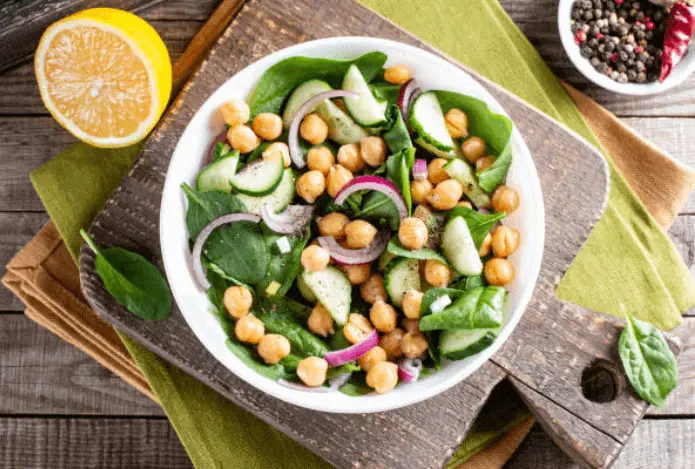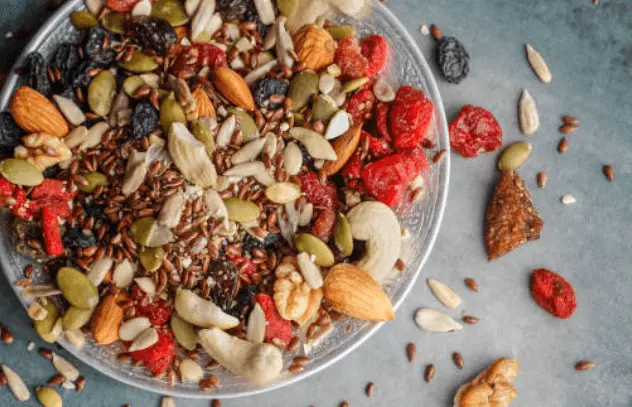The Mediterranean diet is both tasty and good for you because it is full of healthy foods like fruits, vegetables, whole grains, and fats that are good for your heart. It may also assist in maintaining brain function, boost heart health, manage blood sugar levels, and provide other advantages.
Although there are no hard and fast rules for following the Mediterranean diet, there are many general guidelines you can follow to incorporate the diet’s principles into your everyday routine.
This article explains what the Mediterranean diet is, how to follow it, and how it can benefit your health.
What exactly is the Mediterranean diet?
The Mediterranean diet is based on traditional Mediterranean meals that are consumed in countries such as France, Spain, Greece, and Italy. Researchers discovered that these folks were extremely healthy and had a reduced risk of several chronic diseases.
Although the diet has no rigid rules or regulations, it often promotes fruits, vegetables, whole grains, legumes, nuts, seeds, and heart-healthy fats. Processed foods, sugar, and processed grains should be avoided.

Numerous studies have now demonstrated that the Mediterranean diet can assist in weight loss while also helping to reduce heart attacks, strokes, type 2 diabetes, and premature death.
As a result, the Mediterranean diet is frequently suggested for persons seeking to enhance their health and prevent chronic disease.
Advantages of the Mediterranean Diet:
The Mediterranean diet has been linked to a slew of health advantages.
Improves cardiac health
The Mediterranean diet has been thoroughly researched in terms of its ability to boost heart health. Indeed, research suggests that the Mediterranean diet may be associated with a lower risk of heart disease and stroke.
One study compared the Mediterranean diet to a low-fat diet and found that the Mediterranean diet was more successful at slowing the advancement of thickening the inner lining of the arteries, which is a key risk factor for heart disease.
Other research indicates that the Mediterranean diet may help lower diastolic and systolic blood pressure levels, supporting heart health.
Maintains healthy blood sugar levels
The Mediterranean diet encourages a wide range of foods that are full of nutrients, like fruits and vegetables, nuts and seeds, whole grains, and fats that are good for your heart. So, sticking to this way of eating may help keep blood sugar levels stable and stop type 2 diabetes from happening.
Interestingly, several studies have discovered that the Mediterranean diet can lower fasting blood sugar levels and enhance haemoglobin A1C levels, a marker used to assess long-term blood sugar control.
Insulin resistance is a condition in which the body can’t use insulin to control blood sugar levels as well as it should. The Mediterranean diet has also been shown to lower insulin resistance.
It safeguards brain function.
Several studies indicate that the Mediterranean diet may be good for brain health and may even guard against cognitive loss as you age.
One study, for example, indicated that increased adherence to the Mediterranean diet was associated with enhanced memory and decreases in numerous risk variables for Alzheimer’s disease. Other studies have linked the Mediterranean diet to a lower risk of dementia, cognitive impairment, and Alzheimer’s disease.
Also, a review found that healthy older people who ate a Mediterranean diet had better brain function, memory, attention, and processing speed.
How to Implement It
- Eat regularly: fruits, vegetables, seeds, legumes, potatoes, whole grains, nuts, herbs, spices, fish, seafood, extra virgin olive oil
- Eat in moderation: poultry, eggs, cheese, yoghurt
- Eat rarely: red meat, processed meat, sugar-sweetened beverages, added sugars, refined grains, refined oils, and other highly processed foods

Foods to consume
The exact foods that make up the Mediterranean diet are debated, mostly because of differences between regions. The majority is a diet rich in nutritious plant foods and low in animal products and meat. However, it is advisable to consume fish and seafood at least twice each week.
The Mediterranean way of life also includes regular physical activity, shared meals, and stress reduction.
You can blend fresh, frozen, dry, and canned fruits and vegetables into your diet, but be sure to read the package labels for extra sugar and sodium.
You should ideally base your diet on the following healthy Mediterranean foods:
- Vegetables: potatoes, tomatoes, spinach, onions, broccoli, kale, cauliflower, carrots, brussels sprouts, cucumbers, sweet potatoes, turnips
- Fruits: bananas, apples, oranges, strawberries, grapes, pears, dates, figs, melons, peaches
- Nuts, seeds, and nut butter: walnuts, almonds, hazelnuts, macadamia nuts, cashews, sunflower seeds, pumpkin seeds, almond butter, peanut butter
- Legumes: beans, peas, lentils, pulses, peanuts, chickpeas
- Whole grains: oats, brown rice, rye, barley, corn, buckwheat, whole wheat bread
- Fish and seafood: salmon, sardines, trout, tuna, mackerel, shrimp, oysters, clams, crab, mussels
- Poultry: chicken, duck, and turkey.
- Eggs: quail, chicken, and duck eggs
- Dairy: cheese, yoghurt, and milk
- Herbs and spices: garlic, basil, mint, rosemary, sage, nutmeg, cinnamon, pepper
- Healthy fats: extra virgin olive oil, olives, avocados, and avocado oil

Foods to avoid
When following the Mediterranean diet, you should minimize the following foods and ingredients:
- Added sugar: added sugar can be found in a variety of meals, but it is most prevalent in soda, candy, ice cream, table sugar, syrup, and baked goods
- Refined grains: tortillas, white bread, pasta, chips, crackers
- Trans fats: fried food, margarine, and other processed foods
- Refined oils: canola oil, soyabean oil, cottonseed oil, grapeseed oil
- Processed meat: processed sausages, hot dogs, deli meats, and beef jerky.
- Highly processed foods: fast food, convenience dinners, microwave popcorn, and granola bars
Beverages
On a Mediterranean diet, water should be your go-to beverage.
You can consume red wine on a Mediterranean diet, but only in moderate amounts. This is entirely optional, and wine should be avoided by certain people, including those who are pregnant, have difficulties drinking in moderation, or are taking certain drugs that may interact with alcohol.
For those following the Mediterranean diet, beverages like coffee and tea are also considered to be beneficial. Avoid using a lot of extra sugar or cream.
Sugar-sweetened liquids, such as soda or sweet tea, are rich in added sugar and should be avoided. Fruit juice is acceptable in moderation, but choosing whole fruits will provide you with more fibre.
Menu examples for Mediterranean Diet:
An example Mediterranean diet menu for one week is provided below.
Adjust the amounts and food options to your individual needs and preferences, and add snacks as required.
Monday
- Breakfast: Greek yoghurt with strawberries and chia seeds
- Lunch: a whole grain sandwich with hummus and vegetables.
- Dinner: a tuna salad with greens and olive oil, followed by a fruit salad.
Tuesday
- Breakfast: oatmeal with blueberries
- Lunch: Caprese zucchini noodles topped with mozzarella, cherry tomatoes, olive oil, and balsamic vinegar
- Dinner: salad with olives, cucumbers, tomatoes, farro, grilled chicken, and feta cheese
Wednesday
- Breakfast: a mushroom, tomato, and onion omelette
- Lunch: whole grain sandwich with cheese and fresh vegetables
- Dinner: Mediterranean lasagne
Thursday
- Breakfast: yoghurt with sliced fruit and nuts
- Lunch: quinoa salad with chickpeas
- Dinner: broiled salmon with brown rice and vegetables

Friday
- Breakfast: eggs and sautéed vegetables served with whole wheat toast.
- Lunch: pesto-stuffed zucchini boats with turkey sausage, tomatoes, bell peppers, and cheese
- Dinner: grilled lamb with salad and baked potato
Saturday
- Breakfast: oatmeal with raisins, almonds, and apple slices
- Lunch: whole grain sandwich with vegetables
- Dinner: Mediterranean pizza topped with cheese, vegetables, and olives cooked with whole wheat pita bread.
Sunday
- Breakfast: omelette with vegetables and olives
- Lunch: a falafel dish topped with onions, tomatoes, feta, hummus, and rice
- Dinner: grilled chicken with vegetables, sweet potato fries, and fresh fruit
In the Mediterranean diet, there is usually no need to monitor calories or track macronutrients (protein, fat, and carbohydrates).
Snacks that are healthy
If you get hungry in between meals, there are plenty of healthful snack options on the Mediterranean diet.
Here are some ideas to get you started:
- mixed nuts
- fruits
- hummus on baby carrots
- Greek yoghurt
- mixed berries
- salt and pepper hard-boiled egg
- almond butter on apple slices
- guacamole and chopped bell peppers
- fresh fruits and cottage cheese
- pudding with chia seeds

Eating out
Many restaurant dishes are Mediterranean-friendly. Choose whole grains, veggies, legumes, fish, and healthy fats wherever possible. It’s also important to eat and savour your dinner with nice company, so choose something that sounds good.
Here are a few pointers to help you adapt foods when eating out:
- As your main course, select fish or seafood.
- Inquire with your server whether you can cook your cuisine with extra virgin olive oil.
- Instead of butter, use olive oil on whole grain toast.
- Vegetables can be added to your order.
In conclusion
Though there is no single Mediterranean diet, this eating pattern is often high in nutritious plant foods and low in animal foods, with an emphasis on fish and shellfish.
Mediterranean Diet has been linked to a variety of health benefits, including the ability to help balance blood sugar levels, support heart health, and improve cognitive function, among other things.
Best of all, you may tailor the Mediterranean diet principles to your own needs. If you loathe fish and sardines but enjoy whole wheat pasta and olive oil, start creating wonderful Mediterranean-inspired meals with things you enjoy.
